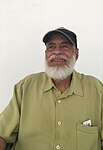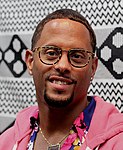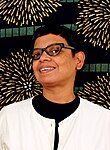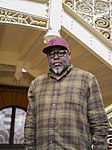Grants:Project/BlackLunchTable/BLT 2018/Final
![]() This project is funded by a Project Grant
This project is funded by a Project Grant
| proposal | people | timeline & progress | finances | midpoint report | final report |
- Report accepted
- To read the approved grant submission describing the plan for this project, please visit Grants:Project/BlackLunchTable/BLT 2018.
- You may still review or add to the discussion about this report on its talk page.
- You are welcome to email projectgrants
 wikimedia.org at any time if you have questions or concerns about this report.
wikimedia.org at any time if you have questions or concerns about this report.
Welcome to this project's final report! This report shares the outcomes, impact and learnings from the grantee's project.
Part 1: The Project
[edit]Summary
[edit]First staged in 2005, Black Lunch Table (BLT) is an ongoing collaboration between artists Jina Valentine and Heather Hart. The BLT addresses historical omissions, mobilizing a democratic rewriting of contemporary cultural history by animating discourse around and among the people living it. BLT Wikipedia edit-a-thons mobilize a collective authoring of a specific set of articles related to the lives and works of Black artists. Many significant Black artists are under-documented or completely missing from Wikipedia and the BLT User Group is dedicated to hosting events focused on improving or creating pages for Black visual artists, and by actively cultivating a more diverse editorship.
During our 2018 WMF Project granting period we:
- We went to Wikimania and learned a lot about the project and its potential. Connecting with WhoseKnowledge, A+F, and AfroCrowd in workshops and in conversation afterwards was particularly formative. While in South Africa, we also hosted edit-a-thons outside the conference in Cape Town and Johannesburg. At the conference we hosted a roundtable event for Wikimedians to discuss the sociopolitical aspects of the movement, their work in it, and issues related to equity and access to knowledge and technology. This, along with the pre-conference organized by WhoseKnowledge were particularly useful in framing the work we are doing and imagining what it could be.
- Much of the fall was spent reviewing our personnel needs and evaluating the potential value of each position needed. Running the entire project for sometime between two artists the logistics of unraveling all the component parts and tasks of the project to be parsed out to team members took more time than expected.
- We hired a Wiki Project Manager to support the operational capacities of our user group and assist with PR, administration, and management of our regional proxies. We conducted a search for, interviewed, and hired three BLT proxies to host three events each in their local communities (Trinidad & Tobago, Nigeria, Texas). Additionally, to support the ongoing work in our own communities (Chicago, NYC), we worked with temporary personnel in facilitating edit-a-thons, WikiCommons photo initiatives, and research.
- Worked on our portfolio of onboarding documents and procedures. Critical to working with proxies and sharing this process and our project with other potential hosts. Not an effort to standardize but to determine the critical elements to include, refine, and allow for creative interpretation and adaptation to each location.
- Worked on revising our order of operations between project leads/project manager/assistant/regional proxies as well as utilizing workflow managers like ASANA. Task management software has been effective in ideating and strategizing large-scale projects; it’s possible to organize the various processes and aspects into tasks with deadlines. As everyone on the team is also able to comment on and revise task descriptions, it’s also important in establishing a horizontal organization.
- Held a full team retreat where we were able to solidify action steps in HR/administration as well as audience/outreach category. Administration steps already in motion include creating a wiki project banner for our meetup page and streamlining the onboarding process. Importantly in terms of audience, we are revisiting the language that we use to describe and share the project as we recognize that we interface with a variety of different publics.
- We worked with a pro bono lawyer (David Swendsen) through Lawyers for the Creative Arts to execute and file our application for 501c3 status. During this time we were able to begin drafting the structure of the board and bylaws. It was useful to do this at the same time as we grew our WikiProject.
- We hosted a total of forty-six edit-a-thons, including events in six new regions, bringing our work and the work of Black Artists to new editors/audiences.
- We formalized GLAM and educational initiatives, including a semester-long classroom engagement at Edna Manley University in Kingston, Jamaica and formulated documents to directly engage students in edit-a-thons and photo initiatives.
- We coupled our edit-a-thons with our WikiCommons BLT Portrait Initiative. By hiring professional photographers for each event, we expanded our impact on the Wikimedia Universe by adding diverse and important portraits of Black Artists, created by artists local to the events’ regions. We’ve uploaded 936 new photographs to Wikipedia Commons during our granting period based on Outreach Dashboard statistics. This work was turned into a learning pattern by the Whose Knowledge? user group pointing to the work we have done initiating this work.
- Our work in regions outside of the continental United States was informative of the ways in which we need to adapt our working process/events to audiences that are editing on mobile or who may not own a computer. As we continue, we are foregrounding these concerns about access and knowledge equity: we are considering sourcing laptops, internet access, space, etc from institutions for work in ‘historically disadvantaged communities’ and we are focusing on engaging publics over institutional engagements.
We have learned a great deal in how to manage and support the work of our proxies. As they are hosting BLT events in different regions and at diverse institutions, their needs are often different than those we encounter in our home cities. Examples include renting generators to supply electricity, renting or purchasing internet access hubs, and international exchange between currencies and financial support needs.
Project Goals
[edit]1. Increase the reach and develop the momentum of our nomadic project via proxies and project management, thereby increasing the presence of Wikipedia in those communities.
We hired three new regional proxies, each is an experienced editor and has an authentic engagement in their home community. We supported the proxy with administrative and financial resources, such that they could approach, advertise, and execute edit-a-thons with a focus and structure behind them. Each held multiple events in their regions so that we could have opportunities for engaging multiple audiences and some audiences multiple times.
2. Double our 2017 outcomes for the coming year.
Our strategy for doubling outcomes included working with proxies in other communities; hosting events in those communities over the course of several weeks or months; continuing to host events in our own local communities; hosting a monthly meet-up for our user group (and curious new editors); encouraging a diverse engagement with editing (ie suggesting grammar-edits; specific content addition; internal links; categories; citation…) has helped new editors find a way in.
3. Afford more new editors one-on-one access to training to help them get the editing bug, fostering return editors. Our edit-a-thons employ various methods to engage editors to meet them where they are physically and in terms of editing ability. Monthly online meet-ups allow editors outside regions we are physically present to talk directly, edit, and ask questions of BLT in real time. Recurring events within the same city/region offer new editors the chance to become familiar with the project and our team. We have refined the ways in which we gather and retain the information of new editors so that we were able to begin to reach back out directly sharing our upcoming events and campaigns. For instance, we make sure to have all new editors add their name to the event specific meetup page as well as gathering emails. This allows us to reach out on and off of the Wikipedia platform to engage editors in our future events and contests maintaining their interest, engagement, and editing.
Project Impact
[edit]Important: The Wikimedia Foundation is no longer collecting Global Metrics for Project Grants. We are currently updating our pages to remove legacy references, but please ignore any that you encounter until we finish.
Targets
[edit]- In the first column of the table below, please copy and paste the measures you selected to help you evaluate your project's success (see the Project Impact section of your proposal). Please use one row for each measure. If you set a numeric target for the measure, please include the number.
- In the second column, describe your project's actual results. If you set a numeric target for the measure, please report numerically in this column. Otherwise, write a brief sentence summarizing your output or outcome for this measure.
- In the third column, you have the option to provide further explanation as needed. You may also add additional explanation below this table.
Story
[edit]Looking back over your whole project, what did you achieve? Tell us the story of your achievements, your results, your outcomes. Focus on inspiring moments, tough challenges, interesting anecdotes or anything that highlights the outcomes of your project. Imagine that you are sharing with a friend about the achievements that matter most to you in your project.
- This should not be a list of what you did. You will be asked to provide that later in the Methods and Activities section.
- Consider your original goals as you write your project's story, but don't let them limit you. Your project may have important outcomes you weren't expecting. Please focus on the impact that you believe matters most.

We made a lot of strides during this granting period including assembling a dedicated and knowledgeable team, hosting successful events in other countries, and organizing internal structures towards our not for profit status. Those accomplishments don’t compare to the core of the work and our project, raising the profile of Black Artists on Wikipedia.
As part of this initiative, our WikiCommons Photo Initiative (a pop-up photo booth) continues to be a highlight of our work. We were invited to host an edit-a-thon with the Fisher Fine Arts Library at UPenn. Photographer Mary Osunlana got a beautiful shot of the multifaceted African-American artist Dindga McCannon who was missing a photo in her Wikipedia bio. Dindga describes herself as “a multimedia, mixed media artist, currently exploring fiber arts […], painter, printmaker, author, illustrator, artists bookmaker, wearable art maker, and teacher.” She also co-founded “Where We At” – one of the first exhibitions of professional black women artists in the US in the 1970s. Dingda was included in the corrective historical survey We Wanted a Revolution: Black Radical Women, 1965-1985 at the Brooklyn Museum.
The Black Lunch Table as a project began 14 years ago and Wikipedia has been an important part of our initiatives for the last 5 years. It was very special to be able to bring together all the arms of our project at the Wassaic Project for a week-long team retreat. In addition to many of us meeting for the first time face to face, as we often work as a remote team, we were able to share our own practices and expertise. This enriches the project for us all and helps us to rely on and work with one another more cohesively without a centralized physical location we work from. The retreat also offered us an extended format to discuss and solve challenges at the moment. For example, proxies hosting edit-a-thons outside of America were faced with challenges we had not considered, generators, advertising, editing on mobile or limited computer availability, the retreat provided the opportunity for the proxies to share and for us as the lead organizers to deeply listen and set up solutions to problems.
Survey(s)
[edit]If you used surveys to evaluate the success of your project, please provide a link(s) in this section, then briefly summarize your survey results in your own words. Include three interesting outputs or outcomes that the survey revealed.
N/A
Other
[edit]Is there another way you would prefer to communicate the actual results of your project, as you understand them? You can do that here!
The two charts above illustrating Structural Completeness metrics demonstrate that there is a significant improvement in the quality of work being done at edit-a-thons. The overall change in mean score between 2018 to 2019, as well as the number of articles included in this count, demonstrates that not only quantity but quality have improved in the past year.
Methods and activities
[edit]Please provide a list of the main methods and activities through which you completed your project.

- Assemble team/search
- -Project manager
- -Project assistant
- -Regional proxies
- Photo project
- -Hired/engaged more than ten professional photographers, in addition to amateurs, across multiple sites
- -Uploaded over 900 new pictures to Wikicommons
- -Proxies in Ilorin, Houston, Jamaica/TT/Detroit
- -Continued to host events in home cities (Chicago, NYC area)
- -Hosted events “nomadically” wherever we visited
- Wikimania
- -Roundtables with Wikimedians was an intersection between the various parts of our project
- -It provided an opportunity for editors, programmers, organizers to converse casually
- -Coalescence of the BLT team (personalities, abilities, dreams) in real time/space
- -Strategy sessions with members of various parts contribute to thinking about the larger project
- -Affirmed goals and founding mission
- -Laid out long-term, mid-term, and short term project goals
- -Integrated goals into action items, delegated/assumed, integrated into task app
Project resources
[edit]Please provide links to all public, online documents and other artifacts that you created during the course of this project. Even if you have linked to them elsewhere in this report, this section serves as a centralized archive for everything you created during your project. Examples include: meeting notes, participant lists, photos or graphics uploaded to Wikimedia Commons, template messages sent to participants, wiki pages, social media (Facebook groups, Twitter accounts), datasets, surveys, questionnaires, code repositories... If possible, include a brief summary with each link.
- Visiblewikiwomen campaign blog post with Whose Knowledge? user group discussing our experiences hiring photographers
- Black Lunch Table portraits, all the uploaded portraits taken on Wikimedia Commons
- Black Lunch Table, new editor training presentation
- Wikipedia:Meetup/Black_Lunch_Table/Resources, the total public-facing list of resources BLT has compiled
- bit.ly/blacklunchtablemeet, Stable meeting link dedicated to our online hangouts and training sessions
- BLT Instagram, BLT Instagram feed
- BLT Twitter, BLT Twitter feed
Learning
[edit]The best thing about trying something new is that you learn from it. We want to follow in your footsteps and learn along with you, and we want to know that you took enough risks in your project to have learned something really interesting! Think about what recommendations you have for others who may follow in your footsteps, and use the below sections to describe what worked and what didn’t.
What worked well
[edit]What did you try that was successful and you'd recommend others do? To help spread successful strategies so that they can be of use to others in the movement, rather than writing lots of text here, we'd like you to share your finding in the form of a link to a learning pattern.
- Your learning pattern link goes here
What didn’t work
[edit]What did you try that you learned didn't work? What would you think about doing differently in the future? Please list these as short bullet points.
- Task management/assignment for on-time completion requires clarity about who is expected to complete which tasks, in what time frame, and how to prioritize them. When a team expands rapidly it is important to clarify the expectations of that role is.
- In the future it would be excellent to have a longer time period to host our edit-a-thons and impact our editors. A significant amount of our granting period was devoted to finding candidates, interviewing, and hiring our team. Once assembled the time to realize events was abbreviated we realized the events in an abbreviated time period.
- It would be incredibly helpful to have regular check-ins with other WMF Project Grantees (like the storytelling one at the beginning) and check-ins with folks at WMF to discuss project progress and setbacks at more regular intervals.
Other recommendations
[edit]If you have additional recommendations or reflections that don’t fit into the above sections, please list them here.
Next steps and opportunities
[edit]Are there opportunities for future growth of this project, or new areas you have uncovered in the course of this grant that could be fruitful for more exploration (either by yourself, or others)? What ideas or suggestions do you have for future projects based on the work you’ve completed? Please list these as short bullet points.
- Additional proxies in new regions
- Contests campaigns to engage recently trained editors
- GLAM engagement and classroom engagement/education
- Training/partnering new publics like BYP100 to empower their own story writing, women’s center
Part 2: The Grant
[edit]Finances
[edit]Actual spending
[edit]Please copy and paste the completed table from your project finances page. Check that you’ve listed the actual expenditures compared with what was originally planned. If there are differences between the planned and actual use of funds, please use the column provided to explain them.
More details regarding spending for BLT 2018 Project Grant may be viewed here.
| Expense | Approved amount | Actual funds spent | Difference |
| Project Manager | 10080 | 14530.25 | -40.25 |
| Lead Organizers | 21840 | 21840 | 0 |
| Project Assistants | 6720 | 5978.44 | 21.56 |
| Regional Proxies | 2225 | 1093.60 | 481.40 |
| Wiki Planning Meeting: Airtravel for team | 4200 | 3096.21 | 1103.79 |
| Wiki Planning Meeting: food | 1980 | 1754.35 | 225.65 |
| Wiki Planning Meeting: lodging | 0 | 151.77 | -151.77 |
| Wiki Planning Meeting: Childcare | 540 | 617.16 | -77.16 |
| Event Costs: Food | 1500 | 579.53 | 920.47 |
| Event Costs: Transportation | 0 | 662.18 | -662.18 |
| Event Costs: Swag/WiFi/misc | 1000 | 1314.54 | -314.54 |
| Event Costs: Childcare | 540 | 245 | 295 |
| Contingency | 0 | 0 | 0 |
| Total | 53000 | 52994.43 | 5.57 |
Remaining funds
[edit]Do you have any unspent funds from the grant?
Please answer yes or no. If yes, list the amount you did not use and explain why.
- Yes
$5.57 was unspent because we stuck strictly to our allotted amount.
If you have unspent funds, they must be returned to WMF. Please see the instructions for returning unspent funds and indicate here if this is still in progress, or if this is already completed:
- in progress
Documentation
[edit]Did you send documentation of all expenses paid with grant funds to grantsadmin![]() wikimedia.org, according to the guidelines here?
wikimedia.org, according to the guidelines here?
Please answer yes or no. If no, include an explanation.
- Yes
Confirmation of project status
[edit]Did you comply with the requirements specified by WMF in the grant agreement?
Please answer yes or no.
- Yes
Is your project completed?
Please answer yes or no.
- No
Grantee reflection
[edit]We’d love to hear any thoughts you have on what this project has meant to you, or how the experience of being a grantee has gone overall. Is there something that surprised you, or that you particularly enjoyed, or that you’ll do differently going forward as a result of the Project Grant experience? Please share it here!
BLT grew SO much this year! We are so grateful for the support that enabled us to grow our project exponentially and meaningfully. As we reflect on the past year we see that the project has made great strides toward achieving many of its goals, and we recognize (and are inspired by) the fact that we still have much work to do! We have made meaningful connections with other projects, community and institutional leaders, found support from generous and inspiring members of the movement, and collaborated with an energized and amazing team of editors.
Things we wish we could have done: It would be incredibly useful to have regular check ins with WMF and or meet-ups and skill sharing sessions with other projects, programmers (community and data) as part of the grant cycle. We would have additional opportunities to connect with project managers to discuss issues related to outreach, metrics tracking, tools testing, etc… We do have these conversations casually at meetups or other events, and do seek out Wikimedians for advice, support, and ideas; though having this built in to the grant program would be great. Additionally, having a stronger connection (more onboarding?) from WMF at the beginning would have been useful--intro to learning patterns, other resources, and other people up front would be great.
- Some BLT Portraits
-
1
-
2
-
3
-
4
-
5
-
6
-
7
-
8
-
9
-
10
-
1l
-
12
-
13
-
14
-
15
-
16
-
17
-
18
-
19
-
20
























